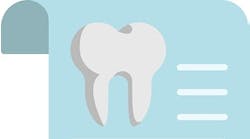Dianne Glasscoe Watterson, MBA
Dear Dianne,
I purchased my practice six years ago from a retiring dentist who had practiced for 42 years. At the time of purchase, there were two business assistants, two chairside assistants, and two hygienists. I'm grateful that all the staff members have remained with me, and our patient base has even grown modestly.
My problem is one of the business assistants. Her computer skills are minimal, and she often makes mistakes. She doesn't seem to mind when there are gaping holes in the schedule, and I believe she sees her role as the office social butterfly. This employee has worked in the practice for 38 years, much longer than anyone else. She is 65 years old and is compensated well above the going rate for her job. The reality is that she gets very little work done, because she is always socializing with patients and coworkers.
I would like to terminate her employment, but I'm afraid I would be risking liability for age discrimination. I believe I have been very patient with her, but I'm at my wit's end. Any suggestions?
- Dr. Ted
Dear Dr. Ted,
Typically in an ownership transition, it is a good idea to retain the existing staff group. It helps when patients come in and see familiar faces of employees as they adjust to a new doctor. However, your dilemma is not that uncommon. I've seen staff members with decades of longevity actually become like anchors holding the practice back, especially when staff members refuse to learn new skills and adapt to new technology.
The place to start is with a job description for each employee's job. If you have two business assistants, one should be designated "financial coordinator" with the primary responsibility of everything financial, while the other would be designated "scheduling coordinator" with the primary duty of maintaining the schedule. Of course, both would assist with telephone answering and check-in/check-out duties. If you have two people at the business desk who kinda-sorta do the same thing, you cannot hold anyone responsible for critical bodies of work, namely finances and scheduling, without specific job descriptions.
Once the job description is in place, you have a basis on which to hold the employee responsible for certain duties. If the employee is not performing her job duties satisfactorily, you have a clear basis to terminate her employment.
The Age Discrimination in Employment Act (ADEA) was passed in 1967 and amended in 1974. Since that time, discrimination has officially been a major employment issue. The Act's stated purpose is "to promote employment of older persons based on their ability rather than age; to prohibit arbitrary age discrimination in employment; to help employers and workers find ways of meeting problems arising from the impact of age on employment."
However, your situation is not about the employee's age; it is about job performance. Now, granted, the employee's advancing age may be contributing to her declining job performance. However, I have seen older employees who are "dynamos" in the workplace too. Any employee termination should be based on the quality of the employee's job performance.
If you are like many doctors, you may feel discomfort at the prospect of terminating a long-term employee. I recommend that you (1) make sure you have a good job description, and (2) have a conference with the employee and spell out your expectations. Give her a chance to ramp up her performance. If she is unable to do that, then you have a decision to make. Maybe she will decide to retire. Be sure to document everything.
All the best,
Diane
Dianne Glasscoe Watterson, MBA, is a consultant, speaker, and author. She helps good practices become better through practical on-site consulting. Please visit Dianne's website at www.professionaldentalmgmt.com. For consulting or speaking inquiries, contact Dianne at [email protected] or call her at (336) 472-3515.





